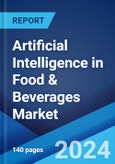Artificial intelligence (AI) represents a branch of computer science concerned with the simulation of human intelligence in programmed robotic machines to make them capable of performing various industrial operations, which usually require human intervention. It is currently employed in the food and beverage (F&B) sector to execute quality control, meal transportation, consumer engagement, industrial standard compliance, product and packaging, and food sorting applications. These services help maintain excellent hygiene standards, ensure the optimal quality of several drinks and food products, retain their nutritional value, detect microorganisms, and reduce wastage by ensuring timely delivery and minimizing overproduction. Apart from this, it optimizes workflow, reduces workload from workers, allows innovation of new products based on consumer recommendations, and enhances purchasing experience. As a result, AI in food and beverage units is extensively used for logistics, preventing human errors, and making better business-related decisions.
Artificial Intelligence (AI) in Food & Beverages Market Trends:
The significant improvements in the food and beverage (F&B) infrastructure represent a prime factor driving the market growth. This is further supported by the increasing need to improve supply chain operational efficiency and the widespread adoption of automated services to sort diverse food and beverage products. Additionally, the rapid expansion in the hotels, restaurants, and catering (HoReCa) sector and the recent establishment of quick service restaurants (QSRs) have facilitated the demand for AI in food beverage units, which is acting as another growth-inducing factor. These solutions help predict sales, analyze, monitor, and deduce customer behavior, and gain valuable consumer insights to make more targeted efforts, create personal level connections through deeper interactions and improve the overall customer experience. Furthermore, the extensive uptake of AI in food beverage to forecast inventory levels to decrease wood wastage, monitor product quantities, detect production cycle time and minimize machine downtime at reduced operational expenses is supporting the market growth. In line with this, the significant technological advancements in terms of food production procedures and the integration of machine learning (ML) solutions are propelling the market growth. They are widely deployed to deduce end goals, refine market strategies, and record every detail from quotations to reduce warehousing costs. Apart from this, the continuous modernization and strategic collaborations amongst key players are positively impacting the market growth.Key Market Segmentation:
This report provides an analysis of the key trends in each segment of the global artificial intelligence (AI) in food & beverages market, along with forecasts at the global, regional, and country level from 2025-2033. The report has categorized the market based on application and end use.Application Insights:
- Food Sorting
- Quality Control and Safety Compliance
- Consumer Engagement
- Production and Packaging
- Maintenance
- Others
End Use Insights:
- Food Processing Industry
- Hotel and Restaurant
- Beverage Industry
Regional Insights:
- North America
- United States
- Canada
- Asia-Pacific
- China
- Japan
- India
- South Korea
- Australia
- Indonesia
- Others
- Europe
- Germany
- France
- United Kingdom
- Italy
- Spain
- Russia
- Others
- Latin America
- Brazil
- Mexico
- Others
- Middle East and Africa
Competitive Landscape:
The report has also provided a comprehensive analysis of the competitive landscape in the global artificial intelligence (AI) in food & beverages market. Detailed profiles of all major companies have also been provided. Some of the companies covered include ABB Ltd., Sesotec GmbH, Siemens AG, Sight Machine, TOMRA System ASA, etc.Key Questions Answered in This Report:
- How has the global artificial intelligence (AI) in the food beverages market performed so far, and how will it perform in the coming years?
- What are the drivers, restraints, and opportunities in the global artificial intelligence (AI) in food & beverages market?
- What are the key regional markets?
- Which countries represent the most attractive artificial intelligence (AI) in food & beverages markets?
- What is the breakup of the market based on the application?
- What is the breakup of the market based on the end use?
- What is the competitive structure of the global artificial intelligence (AI) in food & beverages market?
- Who are the key players/companies in the global artificial intelligence (AI) in food & beverages market?
Table of Contents
Companies Mentioned
- ABB Ltd.
- Sesotec GmbH
- Siemens AG
- Sight Machine
- TOMRA System ASA








